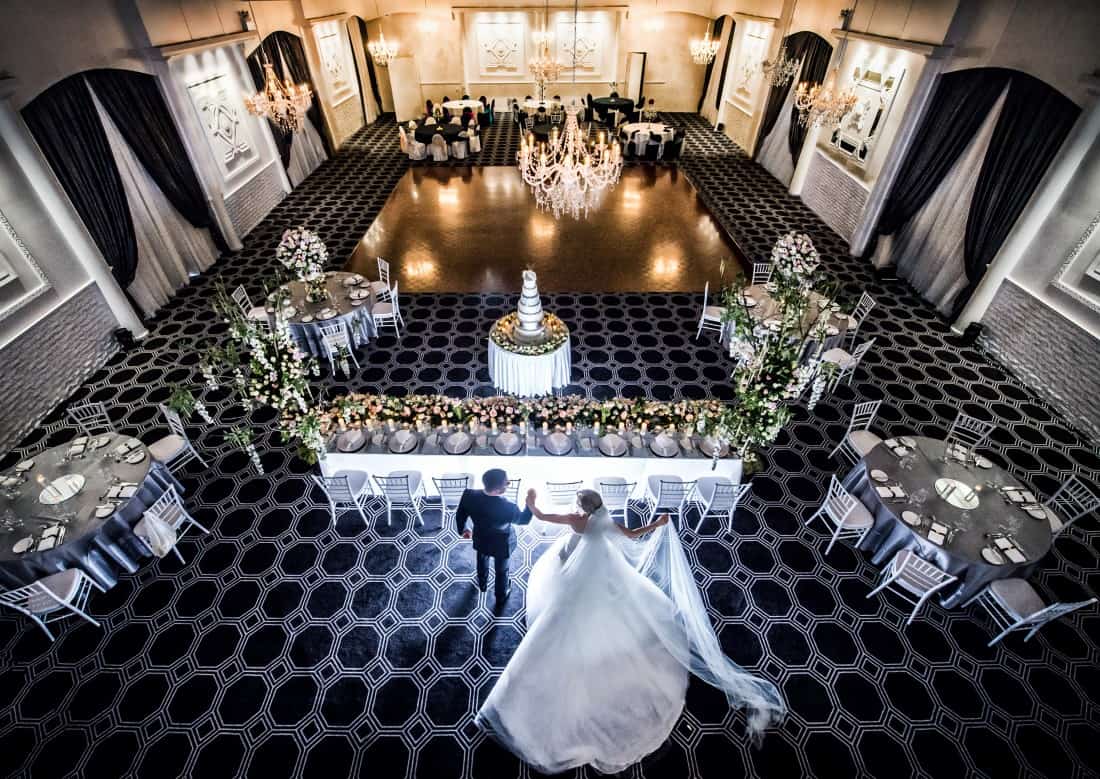Planning a wedding can be one of the most exciting yet overwhelming experiences for brides and grooms. With so many details to coordinate, it’s essential to be organised and prepared. Whether you’re a bride managing every aspect of your big day or a groom stepping up to share the load, this guide will help you easily navigate the planning process. Below, we’ve combined advice tailored for both brides and grooms to ensure a smooth and memorable wedding experience.
Summary
Planning a wedding can be overwhelming for both brides and grooms. Key tips for brides include:
- Starting early.
- Setting a clear budget.
- Finalising the guest list.
- Reviewing vendor contracts carefully.
Brides should choose guests wisely to stay within budget, set a date that avoids conflicts, and ensure they have weather backup plans. Selecting reliable bridesmaids is vital for support throughout the planning process.
For grooms, involvement in planning is essential. Focus on the guest list, date, and menu, select dependable groomsmen, plan the honeymoon, and write meaningful vows. Both brides and grooms should avoid common mistakes like overbooking vendors, crash diets, ignoring small details, and last-minute planning. Consistent involvement and clear communication between the couple will ensure a well-coordinated, memorable wedding.
Wedding Planning Tips For Brides
1. Start Planning Early
Getting an early start on wedding planning is essential for reducing stress and staying organised. The earlier you begin, the smoother the process will be. Some of the most important early steps in planning include:
- Budget: Establish a clear budget as one of the first steps in your planning process. Outline your major expenses, such as the venue, dress, food, and decorations, but remember the hidden costs that can add up quickly.
- Guest List: Before you choose a venue, finalise your guest list. Knowing how many people you invite is important to selecting a location that comfortably accommodates everyone. Having a clear idea of the number of guests will also help you allocate your budget more efficiently, as the number of people directly impacts costs like catering and seating arrangements.
- Insurance and Contracts: Wedding insurance can save you from significant financial losses if something goes wrong, such as a vendor cancelling or extreme weather affecting your event.
2. Choose Your Guests Wisely
Creating your guest list can be challenging. While you may feel obligated to invite certain people, focusing on those who truly matter to you and your partner is important. This is especially true if you’re working within a strict budget, as the size of your guest list will significantly impact your overall expenses.
3. Set The Right Date
The date you choose for your wedding is crucial and can significantly impact guest availability, vendor options, and pricing. Consider whether your chosen date might clash with major events or holidays. For example, hotel availability might be limited, or traffic might become an issue if there’s a big sports event. Additionally, holding your wedding during peak holiday seasons could increase venue costs and travel for guests.
4. Organising Vendors And Contracts
- Do Your Research: Look for vendors with solid reviews and recommendations. Ask friends or recently married couples for their experiences, and always request to see examples of their previous work.
- Clear Contracts: Ensure that all vendor contracts are detailed and clearly defined. They should outline the services, the cost, payment schedules, deadlines, and emergency contingency plans. Take time to review these contracts carefully before signing anything.
- Deposits: Avoid paying large deposits upfront unless it’s an industry standard for that vendor. Schedule payments to protect you in case any issues arise with the service.
5. Weather And Backup Plans
- Outdoor vs. Indoor: If you’re set on an outdoor venue, ensure the location has a covered or indoor alternative available in case of bad weather.
- Tents and Heaters: If your wedding is outdoors, renting tents or space heaters (depending on the season) can greatly affect your guests’ comfort. You can also include fans or umbrellas in hot or rainy weather.
6. Select The Right Bridesmaids
- Close Relationships: When selecting bridesmaids, focus on people with whom you have a strong, lasting relationship, like sisters, best friends, or close family members. These individuals will likely be there for you in the long run and emotionally invested in your big day.
- Avoid Distant Acquaintances: While inviting people you’ve recently met or distant relatives might seem polite, consider whether they will truly be there for you when needed. Selecting bridesmaids who are reliable, organised, and willing to help with planning tasks can ease your workload.
- Supportive Roles: Each bridesmaid will have her role, whether organising the bridal shower, helping you select the perfect dress, or providing emotional support. Ensure that they are people you can lean on for advice and assistance throughout the process.
Wedding Planning Tips For Grooms
1. Get Involved In The Planning Process
Although brides often take the lead in wedding planning, grooms should also be actively involved. Your wedding day is about both of you and sharing responsibilities ensures that they reflect your personality. Grooms can take charge of specific areas, such as:
- Helped organise the guest list and finalised invitations.
- Selecting the menu or assisting with catering decisions.
- Taking charge of booking the DJ or band and deciding on the music.
2. Focus On The Big Three: Date, Guestlist, And Menu
Grooms can contribute to the planning process by focusing on the Big Three aspects of the wedding:
- Guestlist: Collaborate with your partner to create a guest list that includes the most important people in your life.
- Date: As mentioned earlier, be mindful of events or holidays that may conflict with your wedding day. Grooms can help find the perfect date.
- Menu: Decide on a menu that reflects both your tastes. Whether it’s a formal dinner or casual dining, the menu should align with the overall atmosphere of your wedding.
3. Select Your Groomsmen And Best Man
Your groomsmen are your support team throughout the wedding planning process and on the big day. Choose reliable friends or family members who help you stay calm and organised. These people will help with everything from running errands to giving toasts at your reception.
4. Plan The Honeymoon
One area where grooms traditionally take the lead is planning the honeymoon. After the stress of planning the wedding, the honeymoon is your time to relax. Choose a destination that suits both your personalities and make the necessary bookings in advance to avoid last-minute stress.
5. Write Your Vows
If you and your partner are writing your vows, this is your chance to express your love and commitment personally and meaningfully. When writing your vows, focus on the 3 F’s: Fidelity, Forever, and First Love. These principles will help you create heartfelt, sincere, and memorable vows.
Avoiding Common Mistakes
For Brides:
- Overbooking Vendors: Refrain from rushing into signing contracts or making deposits without fully understanding the terms.
- Crash Diets: While every bride wants to look their best, avoid crash diets. Focus on maintaining a healthy and balanced lifestyle leading to the wedding day.
- Ignoring Small Details: Little details matter. Ensure that things like seating charts and guest lists are well-organised well in advance.
For Grooms:
- Last-Minute Involvement: Be sure to start getting involved in the planning process before the last minute. Consistent involvement throughout ensures everything runs smoothly.
- Ignoring Groom Responsibilities: From selecting groomsmen to arranging vendor payments, make sure to fulfil your role in the planning process.
- Forgetting About Vendor Tips: Plan for tipping service providers such as caterers and bartenders, as this can be an unexpected cost.
Practical Considerations For Both
Organising The Day-Of Schedule
To avoid feeling rushed or disorganised on your wedding day, create a clear schedule for the day’s events. Ensure that everyone in the wedding party knows where they must be and when. This includes everything from hair and makeup appointments to when the ceremony begins.
Manage The Guest Experience
Ensure your guests know where to go and how to get there. Provide clear directions to the ceremony and reception venues, and include parking information if necessary.
Don’t Forget About Rsvps
RSVPs are critical to managing your guest list and planning for the reception. Follow up with any guests who haven’t responded by your deadline. This will ensure that your vendors can properly prepare food and seating arrangements.
Conclusion
Incorporating the bride and groom into the wedding planning process creates a balanced and well-coordinated event. Early preparation, clear communication, and teamwork ensure your wedding day runs smoothly. By avoiding common pitfalls and focusing on the most important aspects – budget, guest list, and organisation – you’ll create a wedding that reflects your love and personality as a couple.
FAQs About Wedding Planning
How Do You Plan A Wedding For A Groom’s First Date?
Men’s wedding preparations are 100% for real. The bride has too much on her plate and can’t take on any more work. So the onus is on you to get your life as much as possible. Learn all you can about the wedding’s motif before shopping for a suitable outfit. Do this as soon as possible to have ample time for fittings.
Do You Need A Wedding Planner To Plan Your Groom’s Wedding?
One of the fundamental guidelines for effective wedding planning emphasises maintaining coherence throughout the process. Because this topic is of such significance, you may find that you need to get a wedding planner book to document your groom’s wedding checklist. However, your promises are not something that should be disregarded.
What Should Be On Your Groom’s Wedding Checklist?
After you have sent out invitations to guests, you are responsible for keeping track of all the RSVPs from your family’s side. First, make it a groom’s wedding checklist priority to tick off confirmed guests from your side. Then, follow in their footsteps and verify their contacts and lodging and transportation arrangements.
Why Is It Important To Follow The Steps To Planning A Wedding?
One good reason to plan the date and location of your event before deciding what to wear is so that your outfit is appropriate for the weather and the event’s surroundings. This is one of the many reasons it’s crucial to stick to the wedding planning checklist; there are plenty more.
What Does A Full-Service Wedding Planner Do?
Planner Offering Complete Services A full-service planner covers it all-both design and coordination-from start to finish such as designing the overall concept, hiring and working with vendors and scheduling weekend activities for your visitors, like creating the overall vision, hiring and meeting with vendors and arranging weekend activities for your guests.



